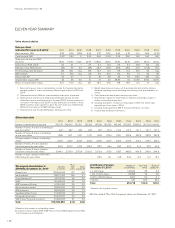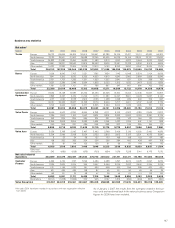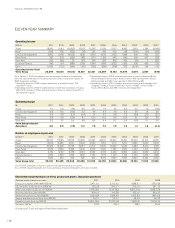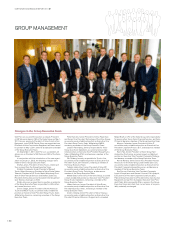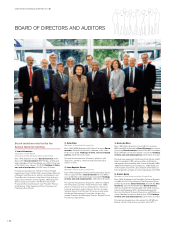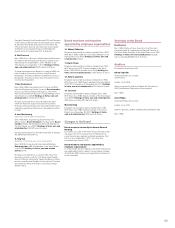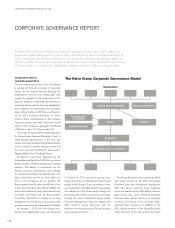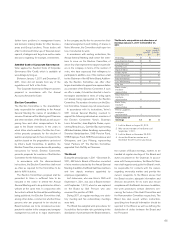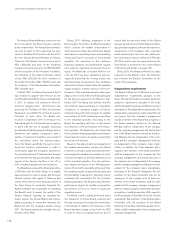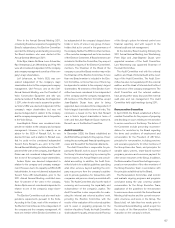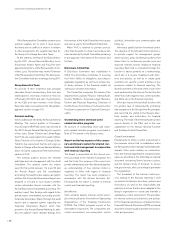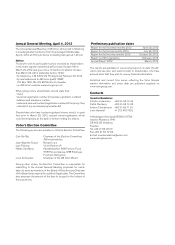Volvo 2011 Annual Report Download - page 160
Download and view the complete annual report
Please find page 160 of the 2011 Volvo annual report below. You can navigate through the pages in the report by either clicking on the pages listed below, or by using the keyword search tool below to find specific information within the annual report.
The Annual General Meeting resolves on the
fees to be paid to the Board members elected
by the shareholders. The Annual General Meet-
ing held on April 6, 2011, approved fee pay-
ments to the Board, for the time until the end of
the next Annual General Meeting, as follows:
Chairman of the Board should receive a fee of
SEK 1,800,000 and each of the remaining
members should receive a fee of SEK 600,000,
with the exception of the President. In addition,
the Chairman of the Audit Committee should
receive SEK 300,000, the other members of
the Audit Committee SEK 150,000 each and
the members of the Remuneration Committee
SEK 100,000 each.
In March 2011, the Board announced that it
had resolved to appoint Olof Persson as the
new President and CEO for Volvo as of September
1, 2011, to replace Leif Johansson when he
would be stepping down. Olof Persson was
previously the President of Volvo Construction
Equipment since 2008. Prior to that, he was the
President of Volvo Aero. The Board also
resolved in September 2011 to introduce new
financial targets for the Volvo Group to apply as
of 2012, with the aim of annually measuring
growth and profitability among the Group’s various
operations and making comparisons with a
number of selected competitors. As a result of
the uncertainty about the macroeconomic
trend, the Board specifically focused on moni-
toring the business environment in order to
continuously adapt the company’s activities to
the prevailing demand. The Board also focused
on the trend for the Group’s operations and visited
several of the Group’s facilities in the US in
2011, meeting management and customers.
The Board also reviewed the financial positions
of AB Volvo and the Volvo Group on a regular
basis and acted in order to ensure that there are
efficient systems with regard to follow-up and
control of the business and financial position of
the Volvo Group. In connection therewith, the
Audit Committee was responsible for preparing
the Board’s work to assure the quality of the
Group’s financial reporting by reviewing the
interim reports, the Annual Report and consoli-
dated accounting. In connection therewith, the
Board met with the company’s auditors during
2011. The Board continuously evaluates the per-
formance of the CEO.
During 2011, following preparation in the
Remuneration Committee, the Board evaluated
Volvo’s systems for variable remuneration to
senior executives, where the performance targets
were based on operating income and operating
rolling cash flow for executives in the industrial
operation. For executives in the customer-
financing operation, the performance targets
were related to operating income and return on
equity. The Board has concluded that the out-
come for 2011 has been satisfactory and con-
sequently found that the existing system was
well-functioning. Irrespective of this, the Board
came to the conclusion that in future, the operating
margin would be a better measure of the per-
formance of the industrial operation than oper-
ating income. In view of the new financial targets
for the Group presented by the Board in Sep-
tember 2011, the Board also believes that the
new financial target pertaining to competitive
comparison of operating margins should be
reflected in the performance targets for variable
remuneration for 2012, pertaining to executives
in the industrial operation. According to the
Board, the operating cash flow is still relevant
as a measure of the performance of the indus-
trial operation. The Board has also found that
for the customer financing operation performance
targets based on return on equity and operating
income are still relevant.
Based on the above mentioned evaluation of
the variable-remuneration systems, the Board
resolved to introduce partly amended perform-
ance targets for variable remuneration to senior
executives to apply for 2012 pertaining to most
of the industrial operation. The new perform-
ance targets are based on the following para-
meters; (i) six months’ operating rolling cash flow,
(ii) operating margin compared to last year and
(iii) profitability measured on operating margin
compared with competitors. For the customer
financing operation, the Board resolved that the
performance targets for variable remuneration
will continue to focus on return on equity and
operating income.
The Board’s work is mainly performed within
the framework of formal Board meetings and
through meetings in the respective committees
of the Board. In addition, the Chairman of the
Board maintains regular contact with the CEO
in order to discuss on-going business and to
ensure that the decisions taken by the Board
are executed. An account of each Board member’s
age, principal education, professional experience,
assignments in the Company, other important
board memberships, their own and related par-
ties’ ownership of shares in Volvo as of February
23, 2012, and the year they were elected on the
Volvo Board, is presented in the section Board
of Directors and auditors on page 153.
During 2011, the Board performed its yearly
evaluation of the Board’s work. The Chairman
has informed the Election Committee on the
result of the evaluation.
Independence requirements
The Board of Directors of AB Volvo must meet
independence requirements pursuant to the
Code. The Audit Committee must also meet inde-
pendence requirements pursuant to the Code
and the Swedish Companies Act. Below is a short
description of the independence requirements. The
independence requirements mainly state that only
one person from the company’s management
may be a member of the Board, that a majority of
the Board members elected by the General
Meeting shall be independent of the company
and the company management and that at least
two of the Board members elected by the Gen-
eral Meeting who are independent of the com-
pany and the company’s management shall also
be independent of the company’s major share-
holders. In addition, the Code stipulates that a
majority of the members in the Audit Committee
shall be independent of the company and the
company management, and that at least one of
the members who is independent of the company
and the company management shall also be inde-
pendent of the company’s major shareholders.
According to the Swedish Companies Act, the
members of the Audit Committee may not be
employees of the company and at least one
member of the Audit Committee shall be inde-
pendent of the company, company management
and the company’s largest shareholders and have
accounting or auditing expertise. With regard to
the Remuneration Committee, the Code sets the
requirement that members of the Remuneration
Committee, with the exception of the Board
Chairman if a member of the Remuneration Com-
mittee, shall be independent of the company and
company management.
CORPORATE GOVERNANCE REPORT 2011
156


